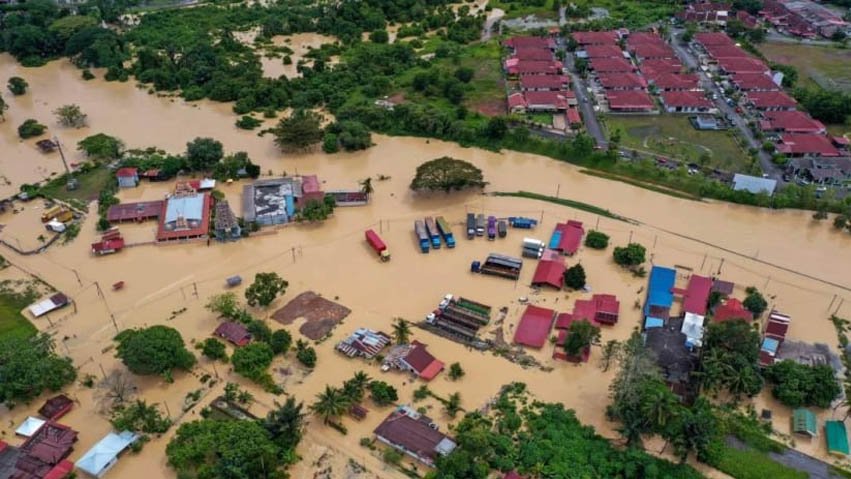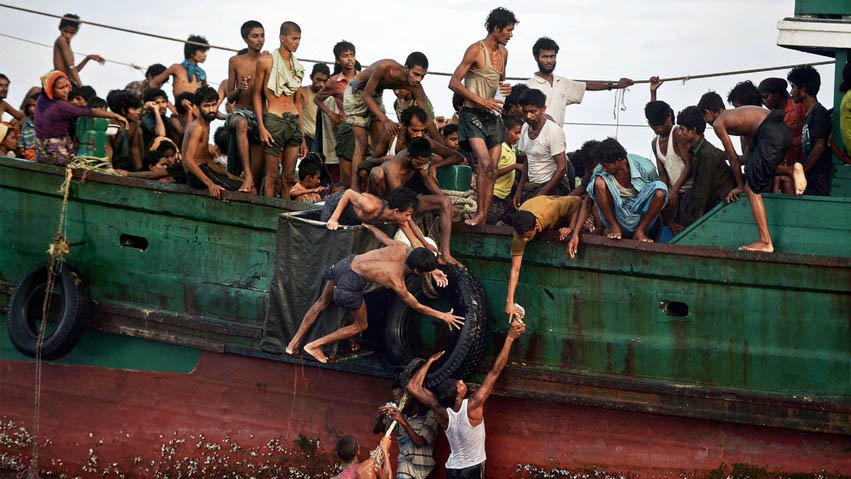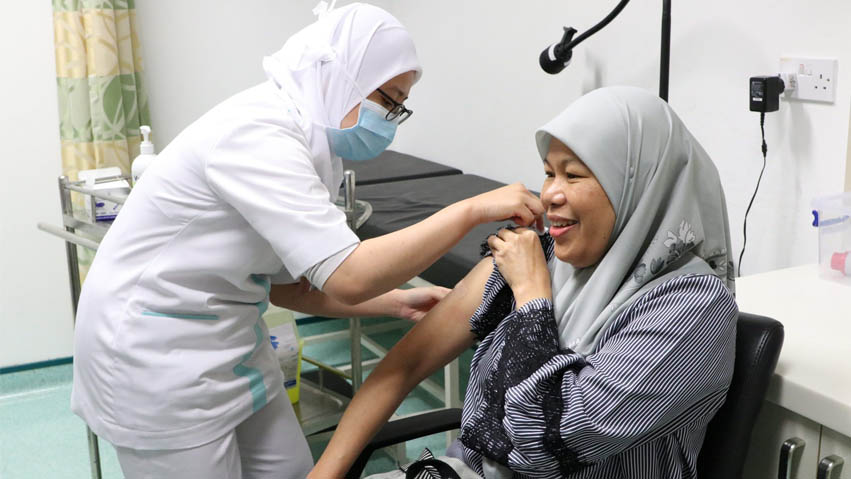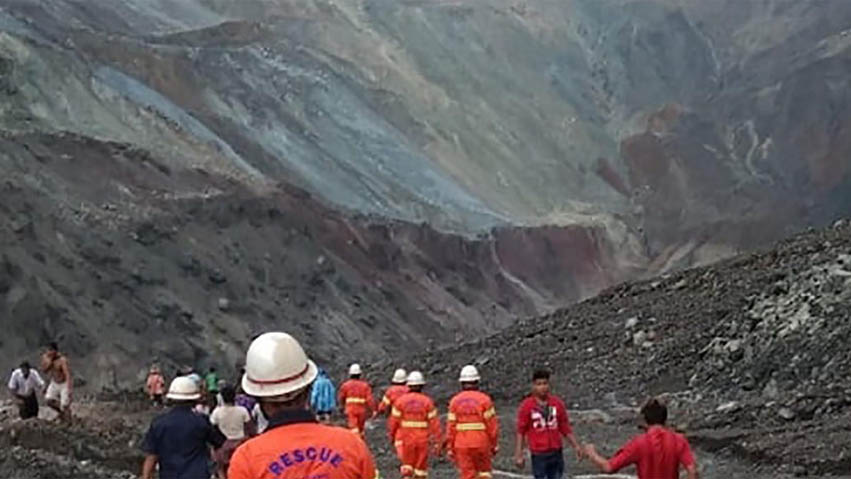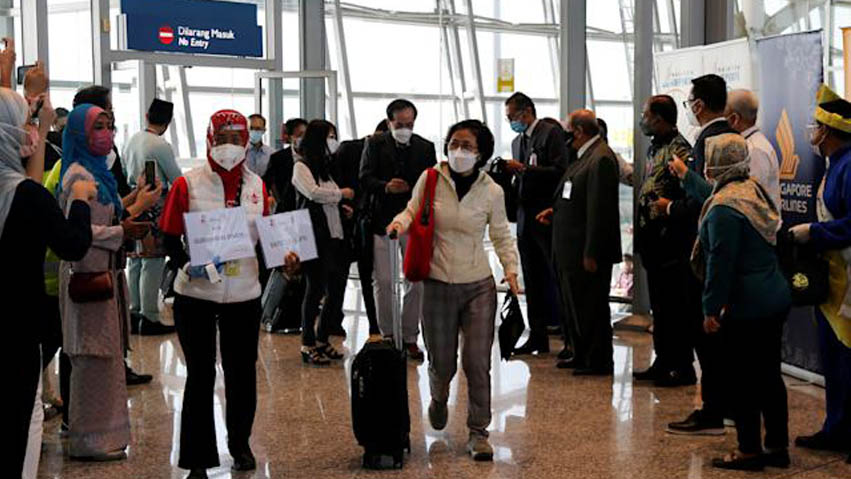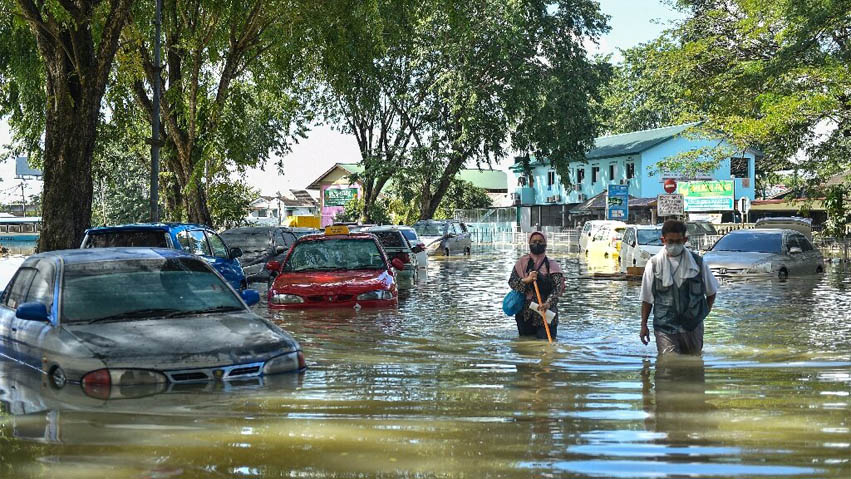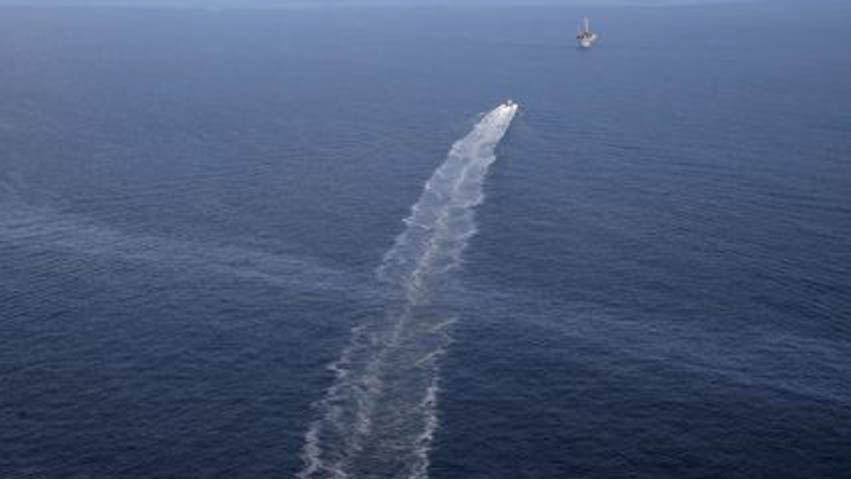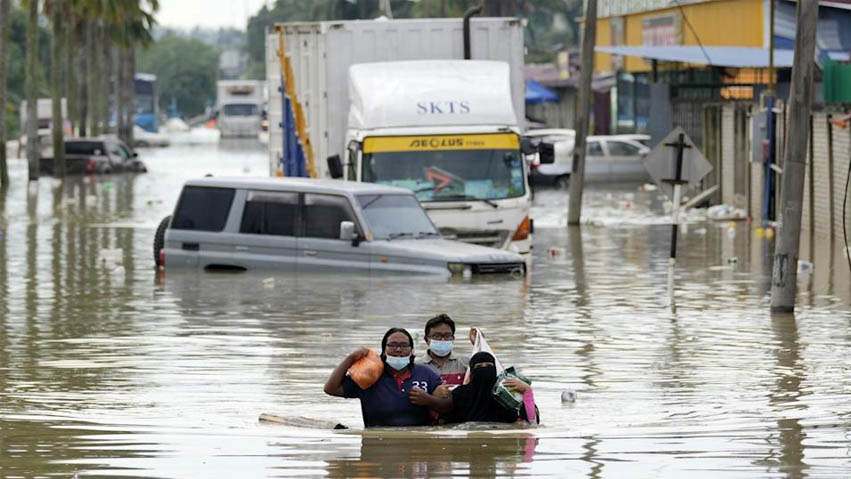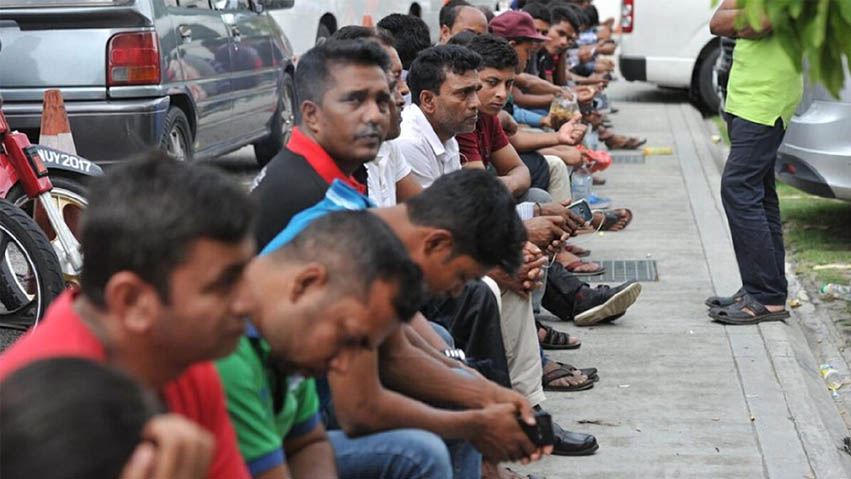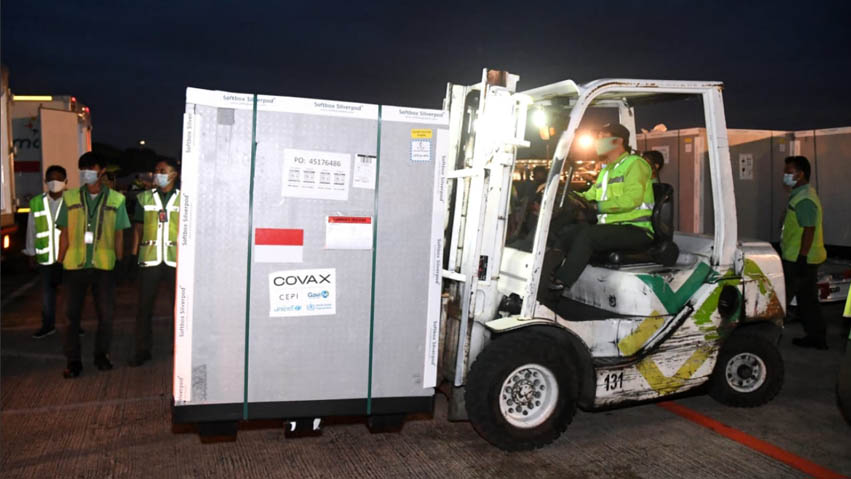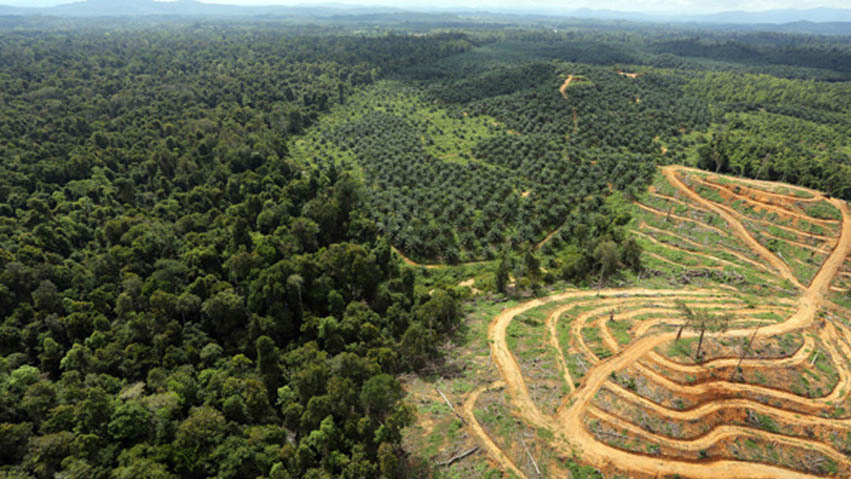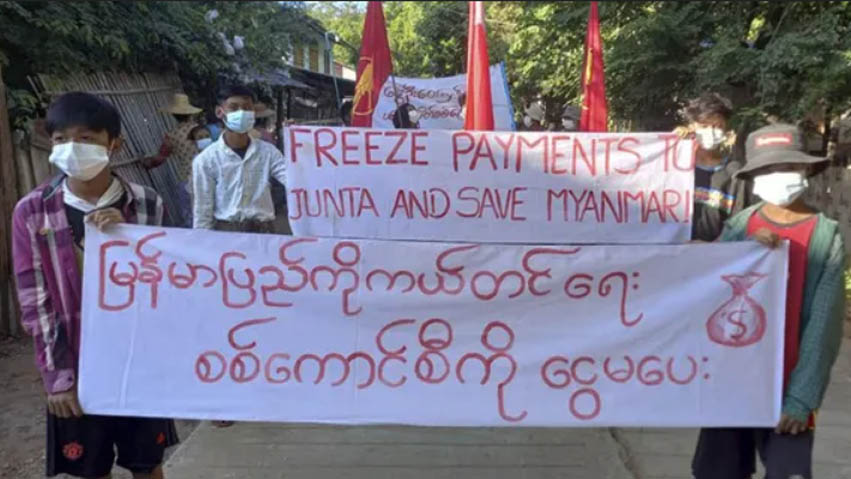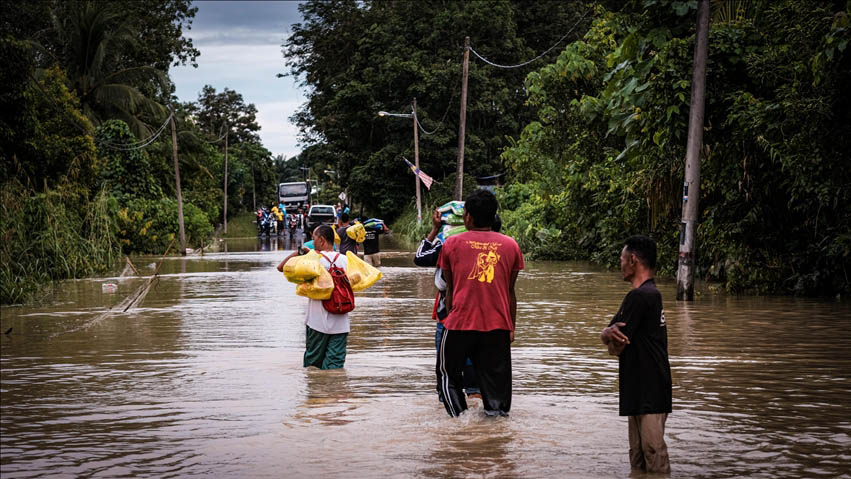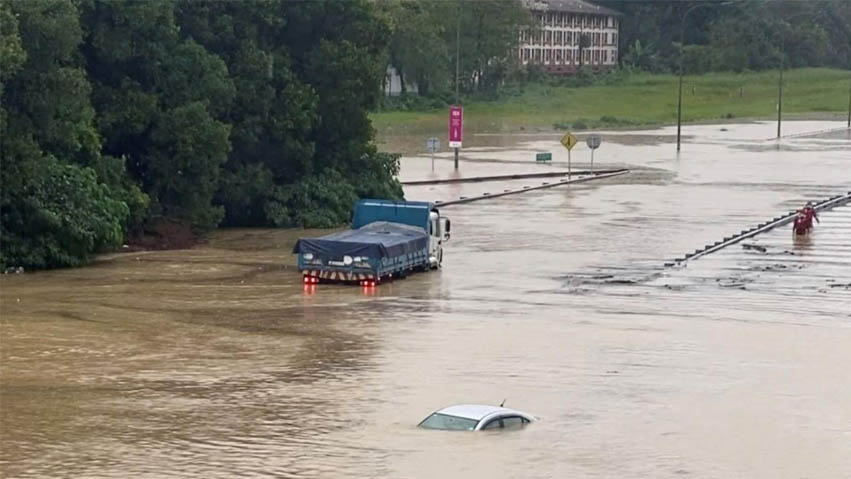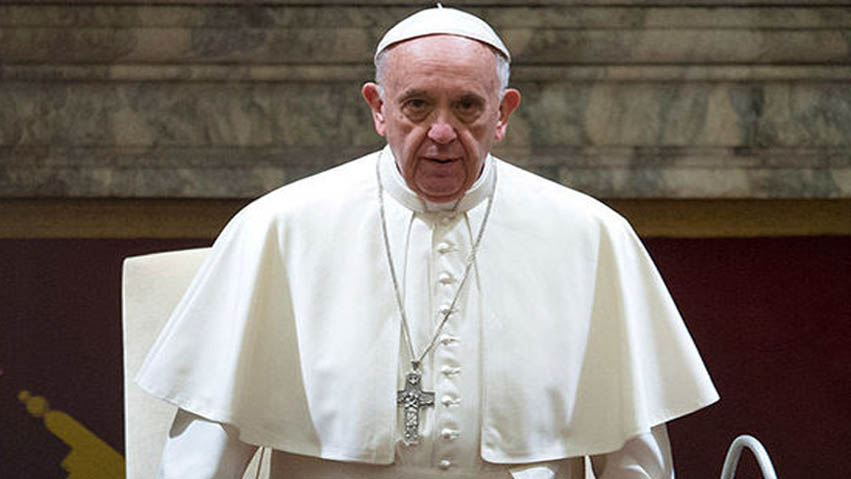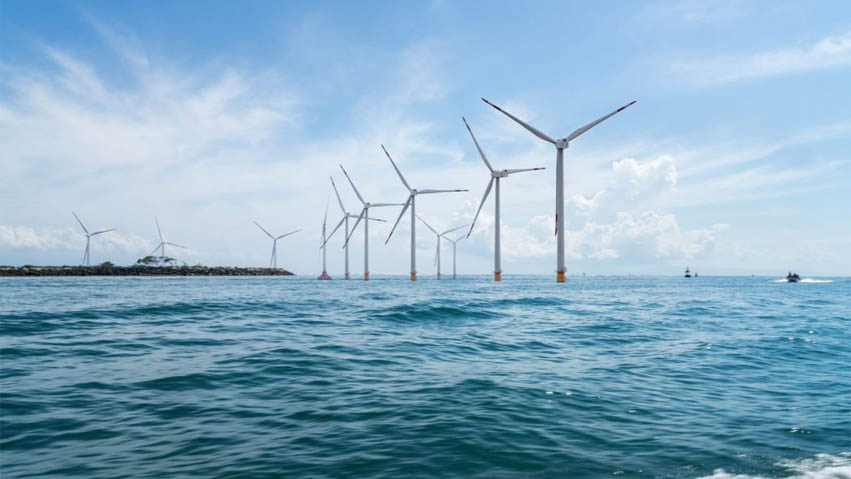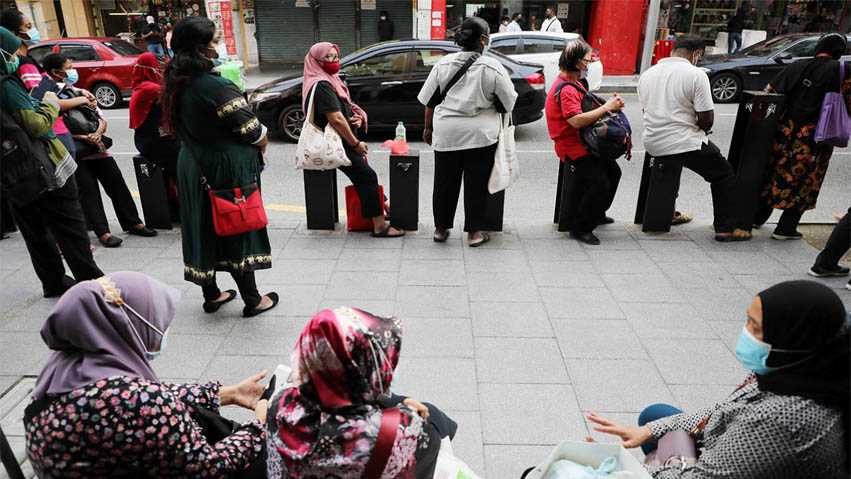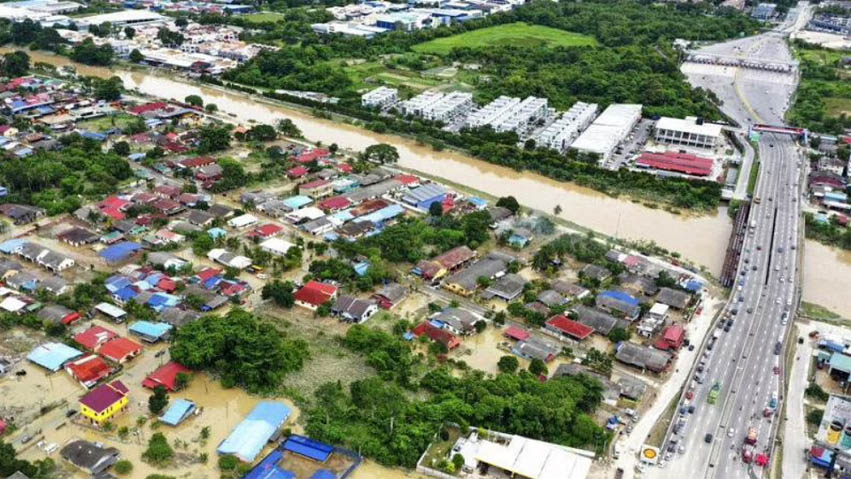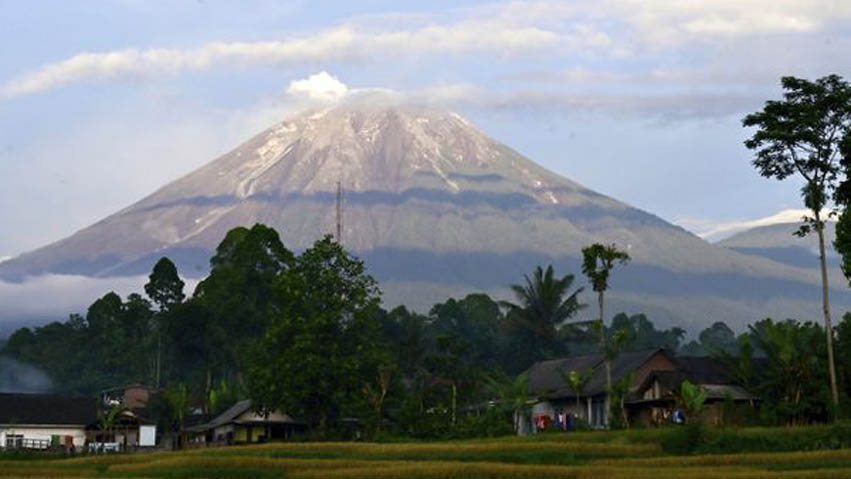-
Posts
4,692 -
Joined
-
Last visited
Content Type
Profiles
Forums
Downloads
Everything posted by ASEAN NOW Content Team
-
With the number of evacuees gradually increasing on Saturday, Johor became the latest Malaysian state to be affected by floods (Jan 1). As about 4 p.m., over 1,000 individuals had been evacuated. After a steady downpour since Friday night, nearly 20 aid centres have been established in two districts: Segamat and Tangkat. Apart from Johor, the number of people fleeing floodwaters in Pahang, Melaka, and Negeri Sembilan increased on Saturday as the four states brace for additional rain. The Malaysian Meteorological Department has issued an orange signal, predicting rain in those states till Monday. According to State Health and Environment Committee chairman R Vidyananthan, three rivers in Johor – Sungai Segamat, Sungai Muar, and Sungai Tangkak – have already reached unsafe levels. According to the Drainage and Irrigation Department's InfoBanjir webpage, the waters in three other rivers in Pahang and two in Negeri Sembilan have also reached unsafe levels. Since December 17, floods in Malaysia have forced tens of thousands of people to flee their homes due to extremely high rainfall that triggered flooding in numerous states. GOVERNMENT SEEKING LONG-TERM SOLUTIONS Malaysian Prime Minister Ismail Sabri Yaakob said on Saturday that authorities are concentrating on finding comprehensive long-term solutions to the flood problem, despite criticism of the government's poor response to the floods last month. Once the post-flood efforts are completed, he said, this would be the principal agenda of the National Disaster Management Committee. State governments, government departments and organisations, as well as professionals in related sectors, are anticipated to participate in the project. Mr Ismail Sabri said after presenting aid under a flood relief programme in Pahang, "We will seek out and discuss whatever modules are suitable to resolve this problem, and if it cannot be implemented simultaneously throughout the country, focus will be given to districts or areas at high risk of flooding." "A long-term strategy comes at a high price, but it helps the government save money each time it floods." We have spent RM1.4 billion (US$335 million) on aid alone so far, and this figure is projected to rise because the entire report on damage has not yet been received," he said. Mr Ismail Sabri stated that the plan for long-term solutions was considered during the Barisan Nasional administration, but that it was not carried out. More flood mitigation initiatives, such as those in Kedah, and construction projects like Kuala Lumpur's SMART Tunnel for flood management in high-risk metropolitan areas like Shah Alam in Selangor, he said, are possible solutions. "We can reexamine the flood resettlement programme initiated in the 1970s for low-lying communities that are prone to floods." Mr Ismail Sabri stated, "This necessitates conversations with state governments to identify suitable high terrain, and the federal government can assist in terms of allocations." The prime minister stated that methods used in other countries, such as the "sponge city" concept used in China to assist reduce the flow of floodwaters or the Dutch river dikes, could be examined if they are suited for Malaysia.
-
Due to worries that insufficient supplies at domestic power plants could lead to widespread blackouts, Indonesia halted coal exports in January, a senior official at the energy ministry said on Saturday (Jan 1). The country will export roughly 400 million tonnes of thermal coal in 2020, making it the world's largest exporter. China, India, Japan, and South Korea are its top customers. Coal miners in Indonesia are required to supply 25% of annual production to state utility Perusahaan Listrik Negara (PLN) at a maximum price of US$70 per tonne, significantly below current market pricing, under the so-called Domestic Market Obligation (DMO) regulation. "Why is it that everyone is prohibited from exporting? It's beyond our control and only exists for a short time. Almost 20 power plants with a combined capacity of 10,850 megawatts will be shut down if the prohibition is not enforced "The energy ministry's director-general of mines and coal, Ridwan Jamaludin, said in a statement. "A widespread blackout could occur if strategic actions are not taken." According to Ridwan, monthly coal shipments to power plants were below the DMO, resulting in a "coal stockpile shortfall" towards the end of the year, and the prohibition will be reviewed after January 5. In a statement, the Indonesian Coal Mining Association (ICMA) urged the energy minister to lift the export prohibition, claiming that the policy was "made hurriedly without consultation with corporate stakeholders." According to ICMA chairman Pandu Sjahrir, the widespread export prohibition might affect monthly coal production volumes of about 38 million to 40 million tonnes. Indonesia has exported roughly 30 million tonnes of coal in January in recent years. The group expressed concern about potential buyer disputes if coal producers declared force majeure because they were unable to supply coal shipments. "Ships sailing into Indonesian waters would also face unclear conditions, which will harm Indonesia's credibility and trustworthiness as a world coal supplier," Sjahrir warned.
-
After an 18-hour rescue operation, the evacuees — largely women and children – were brought ashore at Lhokseumawe in Aceh. Due to severe rains and strong seas, a standoff between a boat carrying Rohingya migrants and the Indonesian navy culminated with a dramatic rescue that took 18 hours to complete. In the early hours of Friday, the refugees — largely women and children – were carried ashore at Lhokseumawe in Indonesia's northwestern province of Aceh. Officials from the health department screened them right away as part of the country's COVID-19 protocol. "We are relieved and grateful to the Indonesian government for allowing the Rohingya to disembark in Aceh on humanitarian grounds," Lilianne Fan, co-founder of Geutanyoe Foundation, an NGO that aids refugees in Indonesia and Malaysia, said. "Indonesia has once again demonstrated remarkable humanity in its treatment of refugees, and this moral approach should be not just recognised but adequately supported," she told Al Jazeera. The United Nations High Commissioner for Refugees (UNHCR) also praised the Indonesian government's move in a statement to Al Jazeera. "We are delighted that Indonesia and its people have once again demonstrated their humanitarian spirit by emphasising the importance of saving lives. Facilitating the rapid disembarkation of vessels in trouble and preventing the loss of life is a humanitarian necessity," said Ann Maymann, UNHCR Representative in Indonesia. After being spotted by fisherman bobbing in waters off the coast of Aceh on Sunday, the wrecked wooden vessel carrying more than 100 Rohingya refugees was rescued. The refugee boat, which had a broken motor and was taking in water, was initially refused by Indonesian police on Tuesday. Before an apparent attempt to push the refugees back into Malaysian waters, photos circulating on social media showed the Indonesian navy preparing food, water, and gasoline for the refugees. This sparked outrage, with NGOs such as Amnesty International and the UNHCR demanding that the refugees be allowed to land, causing Indonesian officials to relent. "Today, the Indonesian government decided, in the cause of humanity, to provide asylum to Rohingya refugees currently afloat aboard a boat near Biereun district, Aceh," said Armed Wijaya, a spokesperson for Indonesia's primary security ministry, in a statement on Wednesday.
-
Beginning at noon on Wednesday, members of the public who need booster injections can make appointments through the redesigned BruHealth app (Dec 22). Minister of Health Dato Seri Setia Dr Mohd Isham Jaafar made the news during his daily press conference on Tuesday. Booster injections will be given to everyone aged 18 and up who have finished their regular immunisation schedule, according to the minister's announcement at a news conference on December 13. To access the new booking option, members of the public must first update their BruHealth app via the Google Play Store or App Store. The app will display a new 'third dose' notification after it has been updated. The third dose will be administered on December 23, according to the ministry. Walk-ins for the third dose are still accessible, but only for the elderly, pregnant women, breastfeeding moms, and differently abled people, according to him. Those obtaining booster doses are being given the Pfizer-BioNTech and Moderna vaccines, depending on availability at vaccination centres. He emphasised that scientific studies have demonstrated that using both types of vaccines as a booster boosts the body's immunity and protects against the Covid-19 infection, independent of the vaccine received in the primary schedule. Meanwhile, Dr Anie Haryani Abdul Rahman, Acting Deputy Permanent Secretary (Policy and Management) at the Ministry of Health (MoH), stated that there is enough vaccination to use as a booster for the entire population. "We are watching the figures" via the booking system, she said. We would consider to extend the operation hours at vaccination centres if there is a positive response from the public to acquire the booster dose." Discover Cigna’s range of health insurance solutions created for expats and local nationals living in Thailand - click to view
-
A collapse at a jade mine in Myanmar may have killed as many as 100 people. The majority of the victims are believed to be illegal miners, and rescue teams are anxiously searching for them in a nearby lake. One person has been identified as deceased. At 04:00 on Wednesday, a landslide occurred in the Hpakant area of northern Kachin state (21:30 GMT Tuesday). Myanmar, often known as Burma, is the world's largest producer of jade, but the country's mines have been plagued by mishaps. An overflow of rubble thrown from vehicles to the open-pit mines is thought to have caused the avalanche. The rubble generates enormous slopes that might be dangerous in an area devoid of trees, requiring persons searching for semi-precious stone shards to work in unsafe conditions. Around 200 individuals from Hpakant and the adjoining village of Lone Khin participated in the search and recovery efforts at the site. In a neighbouring lake, boats were utilised to look for the missing. "We've sent 25 injured individuals to the hospital and found one dead," said Ko Nyi, a member of the rescue squad, noting that up to 100 people could be missing. Although jade mining is prohibited in Hpakant, residents frequently disobey the law because to a lack of economic prospects and poor living circumstances exacerbated by the Covid-19 outbreak. Since the military coup in February, operations have exploded in the area, with landmines aplenty. At least ten inexperienced miners went missing in another landslide at a jade block in Hpakant a few days earlier. In 2020, one of the greatest tragedies in Hpakant claimed the lives of over 160 people, the majority of whom were migrants, when mining debris collapsed into a lake. In 2018, a new gemstone mining law was enacted, however critics claim that the government has too few inspectors with inadequate capacity to curb illicit actions. The military, drug dealers, insurgency groups, and Chinese corporate interests have all been accused of controlling the jade trade and impeding a safer and more sustainable mining of the rare gemstone, according to campaigners. The jade trade in Myanmar is estimated to be worth more than $30 billion (£24 billion) every year, with Hpakant hosting the world's largest jade mine.
-
Singapore announced on Wednesday that it would cease sales of aeroplane and bus tickets to passengers from two dozen nations with which it had created vaccinated travel lanes, a setback for a scheme that the island nation had hoped would help it recover from the pandemic. In response to the rapid spread of the Omicron version of the coronavirus, it joined other countries in the Asia-Pacific area in banning quarantine-free entrance. The suspension will begin on Thursday and last until January 20, according to Singapore's Civil Aviation Authority. Travelers with tickets will be excluded from the freeze, but others will be subject to current border procedures, which include 14-day quarantines, according to the government. The administration has stated that after Jan. 20, ticket sales will be capped at half of current levels. Fully vaccinated tourists from countries such as Australia, the United Kingdom, India, Malaysia, and the United States were allowed to enter Singapore through aircraft or buses under the scheme, although they were needed to have regular Covid tests. Malaysia, too, declared on Wednesday a moratorium on ticket sales to vaccinated visitors wanting to enter from Singapore until January 20. Singapore was a pioneer in introducing protected travel lanes to aid tourism recovery, but the scheme has had its ups and downs. Due to an increase in viral infections, Singapore's travel bubble with Hong Kong was terminated last year. Thailand put an end to a tourism promotion programme that began last month when it reinstated the requirement for foreign visitors to be quarantined, which took effect on Wednesday. The government said it will temporarily block new applications for the so-called sandbox programme, which has enabled visitors to travel around freely as long as they kept inside the island or region where they landed, except for the island of Phuket. Travelers who are completely vaccinated can still enter Cambodia without having to go through quarantine. It also lifted a travel ban imposed on southern African countries. Discover Cigna’s range of health insurance solutions created for expats and local nationals living in Thailand - click to view
-
According to official media, the death toll from Malaysia's worst floods in years has grown to 27, as the weather office warned of more thunderstorms and heavy rainfall in the country's southern and eastern regions. Twenty of the deaths were reported in Selangor state, which encircles Malaysia's capital, Kuala Lumpur, according to the Bernama news agency on Wednesday. Pahang, Malaysia's easternmost state, has reported seven deaths. The floods, which were exacerbated by days of heavy rain over the weekend, have forced 70,000 people to flee their homes. Cities have been flooded, and key roads have been blocked off, due to rivers bursting their banks. The floods have affected 210 locations across six states, according to Bernama. One of the hardest-hit places was Selangor, Malaysia's most densely populated and wealthiest state. Many residents of Shah Alam, the state capital, reported they were stranded in their homes for days with no food before being evacuated on boats in a botched rescue attempt. "We literally lost everything, including our cars and our home." "Everything is gone," Chan Yung, who was evacuated from Shah Alam, said. "We're hoping for some help from the government." Al Jazeera’s Florence Looi, reporting from Kuala Lumpur, said it is still too early to quantify exactly how much damage the flooding brought as many residents were still not able to return to their homes. When the flooding was at its worst, the water level in some areas reached as high as five metres, according to Looi. “The monsoon season is expected to last until February, so there’s potential for more rain and possibly more flooding to occur,” she added. According to Al Jazeera's Florence Looi, reporting from Kuala Lumpur, it's still too early to estimate how much damage the water caused because many locals have yet to return home. According to Looi, when the flooding was at its worst, the water level in certain regions rose as high as five metres. "Because the monsoon season is predicted to persist through February," she noted, "there's a chance for additional rain and maybe further flooding." On Wednesday, the weather bureau in Malaysia, Met Malaysia, forecasted additional thunderstorms and heavy rain in the states of Selangor and Pahang.
-
Local tour operators are concerned about a $6 billion proposal to develop an Indonesian airport into a regional hub rivalling Singapore and Kuala Lumpur, citing concerns about the project's openness and practicality. With 50 million passengers per year, Indonesia's state-owned airport operator and an Indian-led consortium propose turning Kualanamu International Airport in North Sumatra province into one of the region's busiest airports. According to a plan announced earlier this month by Angkasa Pura II and GMR Airports Consortium, passenger counts at the airport will increase fivefold compared to pre-pandemic levels, putting it on par with Kuala Lumpur International Airport and Changi Airport. The GMR Airports Consortium, which is made up of the Indian-owned GMR Organization and the French Aeroports de Paris group, has guaranteed an initial investment of IDR 56 trillion ($3.9 billion) as part of a 25-year contract to develop the airport, with the Indonesian side covering the rest. The deal's unexpected announcement, however, has generated debate in North Sumatra's tourism industry, with some stakeholders questioning why they weren't consulted and fearing the airport had been "sold to India." "I think it's fine to pass it over to foreign management," Mercy Panggabean, the general manager of PT Wesly Tour & Travel in Medan, told Al Jazeera. "Why weren't tour operators invited to talk about this when they were given the tender?" There was no news about all of this until we learned that GMR Airports Consortium had won through the media." Local operators were not opposed to the agreement itself, according to Panggabean, but state-owned Angkasa Pura II needed to be more forthcoming about the project's contents. "Does this imply that direct flights to Kualanamu will be available?" "What is the goal here?" she inquired. Although he had "not seen another Indonesian firm with the same portfolio" as GMR Airports Consortium when it comes to airport development, Clement Gultom, managing director of Boraspati Tour & Travel in Medan, told Al Jazeera he was shocked by the announcement. GMR Group runs Indira Gandhi International Airport in Delhi and Hyderabad International Airport in Hyderabad, India, and has contracts to build airports in Greece and the Philippines. Paris-Charles de Gaulle, Paris-Orly, and Paris-Le Bourget are all owned and operated by Aeroports de Paris in France. Despite local tourism industry concerns, Djamanat Samosir, an expert in Indonesian investment law, told Al Jazeera that there appeared to be little about the deal that gave cause for concern. "The fact that they went through a tender process demonstrates that this was a fair and transparent procedure," Samosir said. "They'll have drafted a clear contract between the parties outlining expectations, and there's nothing unusual about that." We can allege there was something strange about this arrangement if they don't stick to the contract or if there is a subsequent dispute over what was agreed." However, Samosir stated that knowing the particular terms of the project without seeing the contract was impossible. "The most essential thing we need to figure out is that," he remarked. GMR Airports Consortium and Angkasa Pura II did not respond to Al Jazeera's requests for comment. Due to its "extremely strategic location," Kartika Wirjoatmodjo, the deputy minister for state-owned enterprise, said parliament earlier this month that Kualanamu International Airport would be "scaled up to be a world-class airport." GMR Group chairman for energy and international airports Srinivas Bommidala has stated that the corporation plans to "turn the airport into an international centre."
-
According to the country's Air Force chief of staff, Indonesia has acknowledged defeat in its bid to purchase Russian fighter jets and will now choose between the Boeing F-15EX Eagle II and the Dassault Rafale. Air Chief Marshal Fadjar Prasetyo stated the Southeast Asian nation is looking for a 4.5-generation mediumweight or heavyweight fighter during a press conference at Halim Perdanakusuma Air Base near Jakarta. He claimed the Defense Ministry helped reduce the options down to the American F-15EX and the French Rafale, and that Indonesia wants two to three squadrons of fighter jets, depending on the budget. Prasetyo also revealed that Indonesia would cancel its ambition to acquire the Sukhoi Su-35 Flanker-E "with a broken heart." Following negotiations with Russia in 2018, the country selected the Russian twin-engine, single-seat fighter in 2015 but never finalised a deal for 11 aircraft. While Indonesia hasn't said so, it's possible that its hesitation to complete the Su-35 purchase stems from a fear of triggering US sanctions under the Countering America's Adversaries Through Sanctions Act. The measure, which was passed by Congress in 2017, is intended to deter governments and entities from obtaining weapons, military gear, and parts from American foes such as Iran, North Korea, and Russia. If Indonesia chooses the F-15EX, deliveries of the multirole fighter may begin as early as 2027, according to Prasetyo. Indonesia's existing fleet of refurbished Lockheed Martin F-16C/D Fighting Falcons and Russian Sukhoi Su-27/30 Flankers will be supplemented by any new fighter. Previously, the US Air Force was in charge of the former. Indonesia is looking for the aircraft to satisfy its increasingly urgent air defence demands, but budgetary constraints and a large list of military requirements are stymieing efforts to cover the country's air defence gap, which stretches from the eastern edge of the Indian Ocean to Papua New Guinea. Indonesia had previously indicated interest in purchasing Austria's fleet of Eurofighter Typhoon fighter jets, which were being phased out of service owing to cost and a corruption issue.
-
According to the Minister of Health Dato Seri Setia Dr Md Isham Jaafar, 10 additional Covid-19 cases were added in Brunei on Monday, including seven imported instances, increasing the overall number of cases to 15,412. The 1,120 laboratory tests done in the last 24 hours resulted in the number of new cases. As a result, today's positive case rate is 0.9 percent. There are no cases in Category 4 (requiring oxygen assistance and close monitoring) and one case in Category 5 being treated in the National Isolation Centre (requiring assistance of artificial ventilation and treated at the Intensive Care Unit). On Monday, 15 cases were recovered, increasing the total number of recovered cases in Brunei Darussalam to 15,113, with 199 active cases. Meanwhile, 4.3 percent of beds in isolation centres across the country are occupied. As of Sunday (Dec 19), 94.3 percent of the population had received at least one dose of the vaccination; 92.0 percent had received two doses of the vaccine; and 7.7 percent had received three doses of the vaccine.
-
According to a news report, the bodies of at least nine individuals were discovered in Myanmar's central area following a suspected military air raid, with the majority of the dead being civilians, including two children. The victims were recovered by members of a search and rescue team who arrived on the outskirts of Hnan Khar village in Magway region's Gangaw township following the attack, according to Myanmar Now. According to the article, just two of the victims were members of an anti-coup self-defense squad, with the remainder being civilians. Residents in the area and an anti-coup militia spokesman informed the AFP news agency that military personnel had dispatched at least one helicopter to carry out an air raid as the military administration tries to shatter resistance to the coup. According to Myanmar Now, the deadly air strike was carried out by as many as three helicopters. Another resident told AFP that the military used five helicopters in the attack and that troops fired from the air on the 6,000-person community. Following the February coup, anti-coup militias have risen up across Myanmar to fight back; the military government has responded with a crackdown on dissent that has murdered more than 1,300 people, according to a local monitoring group. According to AFP, these "people's defence forces" (PDFs) have astonished the army with their effectiveness, trapping General Min Aung Hlaing's men in a bloodbath. ‘Credible and sickening’ Residents told AFP that military personnel used helicopters and jet jets to raid a PDF meeting in Magway's neighbouring central region of Sagaing on Friday. Military spokesman Zaw Min Tun confirmed that helicopters were utilised in a raid, but did not specify how they were employed. He stated that he did not have any casualty data. When ground soldiers are having difficulty, the military often deploys helicopters and airborne attacks, according to analysts. During heavy confrontations near the town of Momauk in May, the Kachin Independence Army, an ethnic rebel group in Myanmar's far north, claimed to have shot down a military helicopter gunship. The US and the UN both slammed the military earlier this month for what Washington termed as "credible and horrifying" accounts of the deaths of 11 residents, including children.
-
Malaysian Prime Minister Ismail Sabri Yaakob apologised to failings in the government's reaction to flooding that has killed more than a dozen people and displaced more than 60,000 people on Tuesday, predicting further storms and heavy rain in the coming days. After torrential rains began last Friday, causing floods in eight states, the country activated the army and other security forces. The public and MPs have chastised authorities for their tardy reaction, with some individuals being trapped by floodwaters for more than two days before being evacuated, particularly in Selangor, the country's wealthiest and most populated region. According to a broadcast on state-run news channel Bernama TV on Tuesday, the Prime Minister admitted flaws in the coordination of federal security services' reaction. Ismail Sabri added, "I don't dispute (the flaws) and will better in the future." "The burden does not fall solely on the federal government; it also falls on state administrations, with districts serving as the frontline." As a tropical depression headed into four states in Malaysia's north, the Meteorological Department warned that further flooding could occur in the following days. "This condition could lead to flooding in low-level areas in the northern states due to continuous rains and strong gusts," the department warned in a statement. The death toll from the floods in Selangor rose to 17 on Tuesday, with more than 30,000 people being relocated to makeshift shelters, according to the state's Chief Minister, Amirudin Shari. As of Tuesday, about 63,000 people had been relocated across the country, according to the national disaster management office.
-
Experts warn that unless Malaysia's government and businesses handle rising charges of workplace exploitation of migrant workers who fuel the country's economy, the country's export-reliant economic model would be jeopardised. Malaysia has relied on migrant workers to power its staple manufacturing and agriculture for decades, becoming an important element of the global supply chain for semiconductors, iPhone components, medical gloves, and palm oil. However, as the reliance on foreign labour has grown, so has the number of complaints about harsh working and living circumstances for employees, most of whom are from Indonesia, Bangladesh, and Nepal. Inquiries regarding modifying Malaysia's labour rules were not answered by the labour department, and questions about prospective investment losses were not answered by the commerce ministry. M. Saravanan, Malaysia's Human Resources Minister, admitted earlier this month that "forced labour concerns" have "damaged foreign investors' confidence in Malaysia's product supply." He asked businesses to safeguard workers' rights and well-being. According to Rosey Hurst of London-based ethical trade consultancy Impactt, "Malaysia has become the poster child" for forced labour issues. "And this has a negative impact on the economy. Real change is required." Global investors, particularly asset managers and private equity firms, have been inquiring about Malaysia's labour practises, according to Hurst. Other Asian manufacturing hubs, such as China and Thailand, have been accused of similar labour violations. However, analysts warn that recent scrutiny of Malaysia has piqued investors' curiosity, which could effect future foreign direct investment and supply contracts.
-
As part of the 162nd vaccine shipment, the Indonesian government got 482 thousand doses of AstraZeneca's COVID-19 vaccine in completed form. The vaccines were obtained through a contribution from COVAX to address the country's immunisation needs, according to Usman Kansong, Director General of Information and Public Communication at the Ministry of Communications and Informatics. "The timely delivery of vaccines has aided in the acceleration and expansion of immunisation coverage in Indonesia," he noted. President Joko Widodo (Jokowi) has previously requested that newly delivered vaccines be distributed to regions across Indonesia as soon as possible in order to speed up COVID-19 immunizations. The government has continued to educate the people about vaccinations, in addition to ensuring the availability of vaccine stocks and measures to speed vaccinations, Kansong said. He went on to say that the education is being given to individuals who are sceptical of the vaccine and are hesitant to get it. According to Kansong, the COVID-19 vaccination protects against the spread of the SARS-CoV-2 virus, which has mutated multiple times. He went on to say that vaccinations are critical for protecting people and the country from the threat of COVID-19. The government has continued to educate the people about vaccinations, in addition to ensuring the availability of vaccine stocks and measures to speed vaccinations, Kansong said. He went on to say that the education is being given to individuals who are sceptical of the vaccine and are hesitant to get it. According to Kansong, the COVID-19 vaccination protects against the spread of the SARS-CoV-2 virus, which has mutated multiple times. He went on to say that vaccinations are critical for protecting people and the country from the threat of COVID-19. Currently, the Food and Drug Supervisory Agency (BPOM) has issued emergency use licences to 11 brands of COVID-19 vaccinations, he said. According to him, the government has advised the public not to be finicky about vaccination brands because all vaccines issued by the government are equally safe and effective. "Don't take any chances by presuming the pandemic is over. Also, please follow the health rules at all times "He made a statement. In response to the Omicron case discovered in Indonesia, he advised the public to remain calm yet watchful while following health standards and government recommendations. "The appearance of the Omicron variety has reminded us to constantly apply the health protocols and immediately receive immunisation for those who have not," he said, as commanded by President Jokowi.
-
President Joko "Jokowi" Widodo of Indonesia broke ground on a $129 billion "green" industrial zone on Borneo on Tuesday, which would be built with Chinese and UAE investments and powered by a Chinese-funded hydropower plant. The 30,000-hectare (116-square-mile) industrial zone in North Kalimantan province, when completed, will be almost as big as Malta and will serve as a production hub for solar panels, electric car batteries, industrial silicon, and other products. The government plans to finish building of the so-called Green Indonesian Industrial Estate in Bulungan regency by 2024, Jokowi's final year in office. "From here, a leap in Indonesia's economic revolution begins," Jokowi remarked at a groundbreaking ceremony for the industrial zone. According to him, the new zone will create jobs and generate significant money for the state. "This is a collaboration between Indonesia, Indonesian investors, UAE investors, and Chinese investors - all of them working together," he remarked. "Almost all of what will be produced in North Kalimantan will be finished items, so they will contribute a lot of value to our country since we will sell them fully finished," Jokowi stated. The project might cost up to 1,848 trillion rupiah (at least $129 billion), according to Luhut Pandjaitan, the coordinating minister for maritime affairs and investment. At least ten significant Chinese investors have committed to investing in the zone so far, according to Luhut. "They are investors who have demonstrated to have extremely good investment track records," Luhut said at the ceremony. "They have spent tens of billions of dollars in downstream nickel production in Indonesia in recent years." Officials from Luhut's ministry refused to give any information on the Chinese investors. Nickel, a metal mined in Indonesia's Sulawesi and Moluccas areas, is used to make electric car batteries. The nickel smelter business in Indonesia is dominated by Chinese-linked companies, according to data from the Ministry of Energy and Mineral Resources. PT Sulawesi Mining Investment, PT Virtue Dragon Industry, PT Huadi Nickel Alloy, and PT Harita Nickel are among these companies. China's Zhejiang Huayou Cobalt Co. announced in May that it would join with EVE Energy, a battery manufacturer for electric vehicles, to build a $2.08 billion nickel and cobalt factory on Halmahera, a Moluccas island. Hydropower plant and dams Meanwhile, work on a 9,000 megawatt hydropower facility to power the future industrial zone is already started. The $17.8 billion facility is being built by Kayan Hydro Energy with funding from the Power Construction Corporation of China (PCR), according to Luhut. Other investors have expressed interest in the hydroelectric project, which began in 2019 and comprises the construction of five dams, he said. "Initially, the response was lukewarm, but towards the end of 2019, some investors were taking it seriously," Luhut added. "And to build a hydropower plant, you'll need courage, solid execution abilities, and a lot of money." However, there are fears that the five dams planned for the Kayan River and other rivers in the province may endanger the region's beautiful woods and ecology. The Kayan River flows through Kalimantan, the Indonesian part of Borneo Island, where great expanses of forest have been removed for logging, mining, and palm oil cultivation. According to Fabby Tumiwa, executive director of the Institute for Essential Services Reform (IESR), a private think tank, the government should live up to the industrial zone's green certification and compensate for forest areas lost during construction. "The president's ambition is to create a completely 'green' area, therefore everything generated there must be environmentally friendly," Fabby said, adding that the government would have to enforce tight restrictions permitting only renewable energy to be used in the area. According to the World Resources Institute, Indonesia, Southeast Asia's largest and most populous country, is the world's ninth most polluting country, accounting for 2% of global greenhouse-gas emissions. "When it comes to China, they have a systematic approach to pollution control at home. They even have the world's highest industrial norms, requiring industries to limit coal use," Fabby told BenarNews, an RFA-affiliated online news site. "It will be interesting to observe how good the local regulations are. Do they offer incentives and make it a requirement for new investors to use the most up-to-date, efficient technology?"
-
When the young woman in Myanmar understood that money from the company she liked was now in the hands of the military authorities she despised, she decided to speak up. Her dad and she had both worked for Total Energies, a French corporation that owns and runs a valuable gas field off the coast of southern Myanmar with a state-owned company. The military, however, took control of Myanmar's government and bank accounts in February, including those that collect hundreds of millions of dollars each year from the Total Yadana gas field. The young woman joined others across Myanmar in a surge of support for targeted restrictions on oil and gas revenues, the country's single greatest source of foreign currency revenue, as military abuses such as the death and incarceration of thousands increased. However, Western nations, most notably the United States and France, have declined to take that step in the face of pressure from energy industry officials and opposition from countries such as Thailand, which imports Myanmar's gas. The US slapped a slew of sanctions against various Myanmar officials and entities on Friday, but again excluded oil and gas earnings. Outside Total's offices, the young woman screamed slogans and later opposed the military's takeover. She claims she has subsequently lost her job and has been sentenced to three weeks in prison. "We had a nice relationship and good memories of Total," said the young woman, whose name, like the names of other Myanmar gas employees in this storey, has been changed to protect their identities. "Total has taken a lot from Myanmar....so they should at least put in a little effort to support Myanmar at this horrific moment in our country." Myanmar's popular outcry for penalties on gas earnings has become louder in recent months. Activists initiated the "Blood Money Campaign" in August, marching through the streets with posters reading "Freeze payments to the junta and save Myanmar," risking their lives. Others used social media to upload images of individuals with posters that said, "Total, Chevron — Stop accessory to murder." Millions of people across Myanmar are imposing personal sanctions, according to the UN's top expert on human rights in Myanmar, by withholding taxes, refusing to pay power bills, and boycotting military-related businesses. On Nov. 30, 540 Myanmar civil society organisations joined their international counterparts in writing to Total CEO Patrick Pouyanne, requesting that the company "put an end to its role in crimes against humanity" by transferring payments to a holding account. Total is breaking local rules against misappropriating public funds, according to the letter, and "has aligned itself with the junta." The Associated Press also obtained a copy of a letter from Yadana workers to their supervisors earlier this year, in which they requested that Total's subsidiary, Total E&P Myanmar, delay export payments to the military, store the monies in a safeguarded account, and freeze income tax.
-
Following the country's worst flooding in years, Malaysian health officials expect a surge in COVID-19 cases at various relief centres, according to Health Minister Khairy Jamaludin (Dec 20). Mr Khairy warned of an impending surge in COVID-19 infections during a news briefing in parliament, citing the relief centres as high-risk areas where public health precautions could not be fully implemented and complied with. "During floods, the priority is to save flood victims, and sometimes it cannot be helped," Mr Khairy said, as quoted by Bernama. "Some things that should be done, such public health precautions, cannot be implemented or comply with." According to the minister, 181 COVID-19 cases had been found during screening by health authorities at various relief centres as of 11 a.m. on Monday. The biggest number of cases were reported in two states: Selangor (117) and Pahang (52). Positive instances were reported in Kelantan and Kuala Lumpur, with four to six cases each, and one case each in Negeri Sembilan and Melaka. Mr Khairy stated that the majority of people afflicted were asymptomatic or had moderate symptoms, and that they had all been moved to hospitals, quarantine and treatment centres, or other COVID-19-specific facilities. A total of 206 flood victims were identified as close contacts of COVID-19 positive individuals and were sent to designated relief centres and hospitals. Mr Khairy stated that health officials should be prepared for an upsurge in COVID-19 cases. He stated that the public health system had been geared up to accommodate additional patients as a result of the floods. Mr Khairy added that health ministry staff on the ground would continue to examine victims and isolate those who tested positive for COVID-19, and that medical supplies such as face masks and sanitizers would be sent to all rescue centres. Beginning late Friday, heavy rains hammered Peninsular Malaysia's west coast, causing flooding in multiple provinces and displacing tens of thousands of people. At least eight persons are said to have died. According to Bernama, the number of flood victims in Selangor and Pahang has continued to rise, with more than 61,000 people being evacuated to rescue centres. As of 10 a.m. in Selangor, approximately 32,000 evacuees had been accommodated in 162 rescue centres. According to Bernama, the Social Welfare Department's InfoBencana application revealed that 9,181 persons were seeking shelter at 242 relief centres across Pahang. Perak, Negeri Sembilan, Kelantan, Terengganu, and Melaka were also affected. Discover Cigna’s range of health insurance solutions created for expats and local nationals living in Thailand - click to view
-
Authorities have confirmed that at least eight people have died as a result of the floods that have ravaged Malaysia, as the government faces criticism from the public and opposition legislators over its rescue operations. Floods are frequent on Malaysia's eastern coast between October and March during the yearly monsoon season, but particularly heavy rain that began on Friday has put a burden on emergency services across the country. With significant floods in Selangor, the country's wealthiest and most populous district, Malaysia's army and other security agencies have been deployed throughout seven states. According to the state news agency Bernama, eight persons were found dead in the floodwaters in Selangor on Monday. Four of them are in Taman Sri Muda, a neighbourhood in the Shah Alam district where many residents are still reported to be stuck in their homes and apartment buildings due to a lack of boats and staff. According to official data, the number of evacuees in the country increased to almost 51,000 on Monday, with the worst-affected location being the eastern state of Pahang, where 32,000 people were forced to flee their homes. However, with communication lines down in many sections of the state, it's unclear how many more people need to be saved. Selangor, the country's wealthiest and most populous state, which surrounds the capital Kuala Lumpur, has been particularly hard hit, which is uncommon because it usually avoids the brunt of the monsoon floods. On Monday, opposition MPs chastised the government for their slow response. "This will be the third night, and people are still yelling for boats," Democratic Action Party MP Hannah Yeoh told reporters in parliament. "We want (the government) to mobilise aid right away so we don't have to look for bodies anymore." At a statement issued on Monday, Prime Minister Ismail Sabri Yaakob said he has directed all authorities to execute "more active" activities to assist those affected in Taman Sri Muda. After being confined in their home for more than two days, Taman Sri Muda homeowner Sazuatu Remly, 43, and her family were rescued by friends on Monday. "We never received support from the government; we only received help from the parents of the children I was caring for," she told the Reuters news agency. "I sincerely hope that authorities can respond faster and pay more attention to the people here."
-
Cardinal Ignatius Suharyo Hardjoatmodjo of Jakarta, Indonesia's top churchman, has urged Catholics to use Christ's love to foster fraternity in the country's secular society. "Celebrating Christmas should not be limited to the holiday season. This year's celebrations must be jam-packed with events that promote and sustain fraternity. This is critical for our pluralistic and diverse nation," the prelate said in his Christmas message, which was released on Dec. 19. "During this Christmas season, it is critical and essential for our country to build a brotherhood using Christ's love as an inspiration. This can be accomplished through encouraging an attitude of patriotism and care." Cardinal Suharyo, who is also the chairman of the Indonesian Bishops' Conference, believes that unity will help everyone overcome the Covid-19 pandemic, which has damaged every element of life. During the pandemic, Indonesians, like many others around the world, were subjected to severe social restrictions. Restrictions will be in place again this year for Christmas. Christmas activities that involve large crowds in public locations, such as carol performances or shopping mall celebrations, are prohibited. Church services, on the other hand, will continue, with the Jakarta Archdiocese announcing that parish attendance for Christmas and New Year Eucharistic celebrations will be reduced to 40% of church capacity. The archbishop wrote a letter last week urging parishioners to stay at home as "a sort of abstinence" and to help prevent the spread of the Omicron type, which was first detected in Indonesia last week. Indonesia had 4,260,544 Covid-19 cases and 144,002 deaths as of Dec. 19. "To all Christians, a happy Christmas." Let us ring in the New Year together. Cardinal Suharyo advised, "Stay healthy and blessed." Other Indonesian prelates made similar appeals in their Christmas messages. "Religions educate their followers that fraternity is a virtue that allows us to live in harmony with one another. "Fraternity with fellow Muslims, fraternity with fellow citizens, and fraternity with fellow human beings" are three degrees of fraternity mentioned in Islam, according to Franciscan Bishop Leo Laba Ladjar of Jayapura. "The most wonderful Christmas present for Jesus is to nurture fraternity." Because fraternity transcends races, geographies, faiths, and civilizations, as well as social standing and local customs. "This year, let us commemorate Jesus' birth by pulling down dividing walls of hatred, greed, arrogance, and rage." Catholics "are asked to become agents of peace who support and care for the suffering people and who are humble and willing to sacrifice for others," said Archbishop Agustinus Agus of Pontianak in West Kalimantan in his Christmas message.
-
To attain its objective of carbon neutrality by 2060, the Indonesian government predicts that a total expenditure of up to $1,043 billion will be required to create new power plants powered by renewable energy. The Southeast Asian country's power generation is currently mainly reliant on coal. To reach its target of carbon neutrality by 2060, the Indonesian government predicts that a total expenditure of up to $1,043 billion will be required. Power generation in the Southeast Asian country is currently dominated by coal. According to Dadan Kusdiana, Director General of New Renewable Energy (NRE) at the Energy and Mineral Resources (ESDM) Ministry, this number is based on government estimations. Dadan stated the majority of the investment would be spent on creating new renewable energy facilities during his explanation at the Indonesia Business Challenges 2022 event last Thursday, according to Bisnis Indonesia. Plants with a combined capacity of 707.7 GW are expected to be built with the $1,043 billion investment. According to Reuters, the World Bank advised Indonesia to abandon a policy requiring miners to produce a specific amount of subsidised coal to the country's national power utility, PLN, which it claimed encouraged the use of dirty coal in power generation. The suggestion is part of a report released last Thursday with the goal of encouraging more private investment in renewable energy in Indonesia in order to help the country meet its goal of becoming carbon neutral by 2060 or sooner. Indonesia is the world's largest supplier of thermal coal and one of the top 10 emitters of greenhouse gases. According to Reuters, renewables account for about 12% of Indonesia's energy sources, while coal accounts for roughly 60%. According to the Energy and Mineral Resources Ministry, renewable energy utilisation in Indonesia has only achieved 0.3 percent of the country's overall potential. Indonesia has a clean energy potential of 3685 GW, which includes 3,295 GW of solar energy, 95 GW of hydropower, 57 GW of bioenergy, 155 GW of wind power, 24 GW of geothermal energy, and 60 GW of marine energy, according to Sahid Junaidi, secretary of the Directorate General of New, Renewable Energy, and Energy Conservation. Only 10,889 MW of clean energy has been used out of the whole potential, he added, including 194 MW of solar energy, 6,432 MW of hydro energy, 1,923 MW of bioenergy, 154 MW of wind power, and 2,186 MW of geothermal energy. "In addition to renewable energy, a number of novel energy potentials, such as nuclear and hydrogen power, are still little recognised," he noted.
-
According to opposition forces engaged in the area, at least 20 people were killed when the military used helicopters to launch a surprise attack on the village of Hnan Khar in Magway Region's Gangaw Township on Friday. According to a spokesperson for the Yaw Defence Force (YDF), the attack began about 2 p.m. on Friday and lasted about 40 minutes. According to the YDF spokesperson, who spoke on the condition of anonymity for security reasons, three helicopters were part in the assault. He said the 20 individuals killed comprised both YDF fighters and village residents, and that troops aboard the helicopters also opened fire on a community school. "It might be a lot more." Those who went out to collect bodies were shot as well. We can't say how many yet because we weren't able to go very near," he continued. When the incident occurred, the YDF, which operates in Magway's Gangaw, Htilin, and Saw townships, was holding a conference in Hnan Khar to discuss its efforts to combat illegal logging and drug trafficking in the area, according to a spokesperson. According to local villagers, the helicopters landed with troops in Hnan Khar and the adjoining villages of Yehla and Shwebo after the raid. According to one resident of Hnan Khar, the village is being controlled by roughly 150 junta soldiers and members of the military-backed Pyu Saw Htee militia. "In trucks, the military has begun transporting Pyu Saw Htees from pro-army areas to Hnan Khar. "There are also military personnel stationed there," the villager added. At the time of reporting, Myanmar Now was unable to independently verify his claim. Fleeing villagers The majority of Hnan Khar's around 1,000 residents were able to evacuate the village, but some elderly citizens who were unable to flee remain, according to the villager. "We're in a lot of difficulty right now." We must transport old folks who are unable to walk or run. "Some folks fractured their arms or had their legs broken while running," he added. Another Hnan Khar villager who escaped the military raid reported that junta troops opened fire on areas where locals were sheltering numerous times on Saturday. "They combed through the bushes outside the settlement and fired heavy weapons towards the eastern side of the Myittha River," he claimed. On Sunday morning, the military set fire to three houses north of the already almost empty town, according to a YDF spokesperson. According to one local woman who spoke to Myanmar Now on Sunday afternoon, there was more firing in the eastern section of the hamlet later in the day, as well as more fires. "No one dares return to the village." "We heard there are troops hiding there today," the woman stated, adding that she had also heard that several people had been arrested after Friday's attack. According to several accounts, thousands of inhabitants from other villages in the region, including Shwebo, Yaeshin, and Yehla, have also fled their homes since Friday's air raid.
-
On Saturday (December 18), Malaysia reported 11 more Omicron COVID-19 cases, bringing the total to 13. Three people travelled from the United Kingdom, three from the United States, two from Nigeria, two from Saudi Arabia, and one from Australia, therefore all 11 diseases are imported. Malaysians account for nine of the cases, while Nigerians account for two, according to Malaysia's health director-general, Dr. Noor Hisham Abdullah. The 11 instances are among the 18 samples that tested positive for the Omicron variant, according to Health Minister Khairy Jamaluddin's announcement on Thursday. "We were unable to establish the presence of the Omicron variant in the remaining seven samples because whole genome sequencing was not possible due to the low amount of viral load in the samples," Dr. Noor Hisham explained. COVID-19 procedures have been increased up at all international entrance ports and in the community, according to Malaysian health officials, due to an increase in imported Omicron cases. Nigeria, for example, has been added to the list of countries with a high risk of terrorism. Mr Khairy stated earlier this week that travellers from these nations must wear digital tracking devices for the duration of their enforced quarantine. Travellers arriving from the United Kingdom are required to self-test every day during their quarantine and report the findings on the MySejahtera app. While large-scale New Year's Eve festivities are prohibited, Mr Khairy stated that anyone attending small-scale, private holiday events must take self-tests before entering. People should also obtain their COVID-19 vaccination booster doses, according to Malaysia's health ministry. Discover Cigna’s range of health insurance solutions created for expats and local nationals living in Thailand - click to view
-
In Malaysia, more than 30,000 people have been forced to flee their homes due to the country's worst floods in years. The tropical nation in Southeast Asia is prone to rainy monsoon seasons near the end of the year, with flooding causing major evacuations on a regular basis. Rains have caused rivers to overflow since Friday, flooding numerous metropolitan areas and blocking off important routes, stranding thousands of motorists. On an official government website, more than 30,000 individuals have been relocated across eight states and territories, with more than 14,000 of them in Pahang, Malaysia's heartland state. Selangor, the country's richest state, which surrounds the capital, Kuala Lumpur, saw nearly 10,000 people flee their houses, with Prime Minister Ismail Sabri Yaakob expressing surprise at the extreme floods. "The quantity of rain that poured in Selangor yesterday... what would normally fall in a month happened in one day," he said at a press briefing on Sunday. The prime minister promised immediate assistance to flood victims, as well as an initial investment of 100 million ringgit (£17.9 million) to restore damaged homes and infrastructure. On Sunday afternoon, water levels in six states exceeded unsafe levels, according to a government website. As the floodwaters receded from the capital, shop owners returned to their establishments to repair the damage caused by the downpours. The owner of a tourist information centre and souvenir shop, Lee Joon Kee, said he had only recently reopened after being closed for nearly two years due to coronavirus restrictions. "It's a pity, but we don't have a choice." The only option is to go on and clear up the mess, after which we shall begin our new chapter." Hundreds of bus lines in and around the capital, as well as train services to the port city of Klang, have been halted. Three water treatment plants in Selangor were also shut down, leaving tens of thousands of people without water in sections of the state as well as the capital. In 2014, Malaysia saw its worst flooding in decades, causing 118,000 people to abandon their homes.
-
After the country's first case of the omicron version of the coronavirus was discovered in a cleaning worker at a hospital in Jakarta, Indonesian President Joko Widodo warned citizens and government officials to avoid visiting abroad. The patient is being isolated in the Athlete's Village emergency hospital, where the person worked, because he or she exhibits no symptoms. In March 2020, the government opened the hospital to treat COVID-19 patients and serve as a quarantine facility for Indonesians returning from overseas. The illness was confirmed on Wednesday, according to Indonesian Health Minister Budi Gunadi Sadikin, who asked people to continue to follow prescribed measures, such as wearing masks and keeping a safe distance. He also urged for more testing and for the country's vaccination programme to be accelerated. "I advise individuals and state officials to refrain from travelling abroad until the crisis decreases," President Joko Widodo said at a press conference later Thursday. As of Wednesday, Indonesia had registered over 4.2 million COVID-19 cases and over 143,000 deaths. It peaked at 56,757 instances per day in July, as hospitals were overrun by sick patients and ran out of beds and oxygen supplies. Discover Cigna’s range of health insurance solutions created for expats and local nationals living in Thailand - click to view
-
Early on Sunday (Dec 19), Indonesia's Semeru volcano on Java island erupted, releasing a 2km high ash column and forcing authorities to issue a warning to residents to keep away from the eruption range. The eruption of Semeru, Java's tallest mountain, earlier this month blasted ash clouds and pyroclastic flows that killed at least 46 people and left many others missing, as well as displacing others. According to Indonesia's Center for Volcanology and Geological Hazard Mitigation, the early morning eruption produced dense white and grey ash clouds (PVMBG). Due to the possibility of lava flow, the agency cautioned neighbouring inhabitants not to undertake any activity within a 5km radius of the eruption centre and to keep a 500m distance from riversides. People should not conduct any activity within 13 kilometres southeast of the eruption centre, according to PVMBG. With 142 volcanoes, Indonesia has the world's highest population living within 10 kilometres of a volcano, with 8.6 million people living within 10 kilometres.



